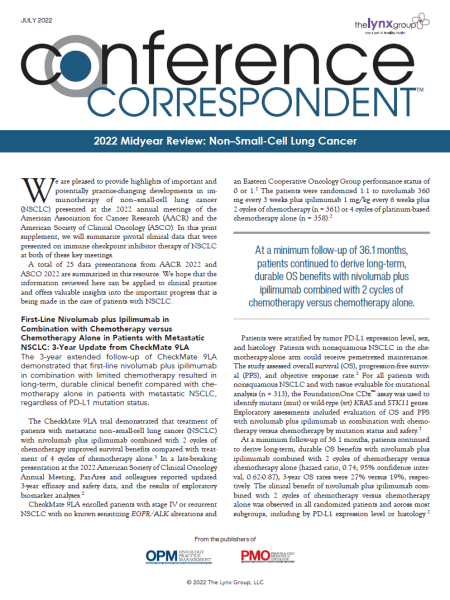Interim analysis of the phase 3 CROWN study shows superior progression-free survival for lorlatinib compared with crizotinib in ALK-positive advanced NSCLC.
ALK rearrangements occur in an estimated 3% to 7% of NSCLCs.1 Crizotinib (Zykadia) was the first ALK inhibitor to be approved for the treatment of patients with ALK-positive NSCLC and set the standard. Lorlatinib (Lorbrena) is a third-generation ALK tyrosine kinase inhibitor with overall and intracranial activity in ALK-positive NSCLC.1
The CROWN study enrolled patients with stage IIIB and stage IV ALK-positive NSCLC who have had no previous treatment of metastatic disease.2 Asymptomatic treated or untreated CNS metastases were allowed.1 A total of 296 patients were randomly assigned to treatment with lorlatinib (100 mg per day, N = 149) or crizotinib (250 mg twice daily, N = 147).2 As of data cutoff for the interim analysis, 103 patients treated with lorlatinib and 31 patients with crizotinib remained on study treatment.2 The median follow-up for the primary end point of PFS was 18.3 months for lorlatinib and 14.8 months for crizotinib.2
Median PFS was not reached with lorlatinib compared with 9.3 months with crizotinib (P <.001) by blinded independent central review (BICR).2 The 12-month PFS was 78% with lorlatinib and 39% with crizotinib.2 ORRs by BICR were 76% for lorlatinib and 58% for crizotinib, respectively.2 Median DOR was not evaluable in the lorlatinib group relative to 11 months in the crizotinib group.2 The intracranial ORRs by BICR were 66% with lorlatinib and 20% with crizotinib among patients with nonmeasurable brain metastasis.2 Among patients with measurable brain metastasis, the intracranial ORRs were 82% and 23%, respectively.2 Median time to CNS progression was not evaluable in the lorlatinib group compared with 16.6 months in the crizotinib group (P <.001).2 OS was not evaluable in either study arm.2 There was, however, an observed trend for a 28% improvement in OS.2
Safety and tolerability were comparable in both study groups.2 Grade 3 and 4 AEs were reported in 72% of lorlatinib patients and 56% of crizotinib patients.2 Serious AEs occurred in 34% and 27%, respectively.2 Seven patients in each treatment arm had fatal AEs.2 AEs leading to treatment discontinuation occurred in 7% and 9%, respectively, whereas 49% and 47% required temporary dose interruptions.2
According to global quality-of-life scores on the European Organisation for the Research and Treatment of Cancer Quality-of-Life Questionnaire Core 30, patients taking lorlatinib maintained their quality of life throughout treatment.2 In contrast, those taking crizotinib experienced deterioration of quality of life over the course of the study.2
Researchers concluded that lorlatinib resulted in a statistically significant and clinically meaningful improvement in PFS compared with crizotinib and should be considered a new first-line treatment option for patients with ALK-positive NSCLC.2
References
1. Goodman A. Lorlatinib improves outcomes over crizotinib in first-line setting of ALK-positive NSCLC: CROWN trial. October 25, 2020. https://ascopost.com/issues/october-25-2020/lorlatinib-improves-outcomes-over-crizotinib-in-first-line-setting-of-alk-positive-nsclc-crown-trial. Accessed November 30, 2020.
2. Solomon B, Bauer TM, De Marinis F, et al. Lorlatinib vs crizotinib in the first-line treatment of patients (pts) with advanced ALK-positive non-small cell lung cancer (NSCLC): results of the phase III CROWN study. Ann Oncol. 2020;31(suppl_4):S1180-S1181.

